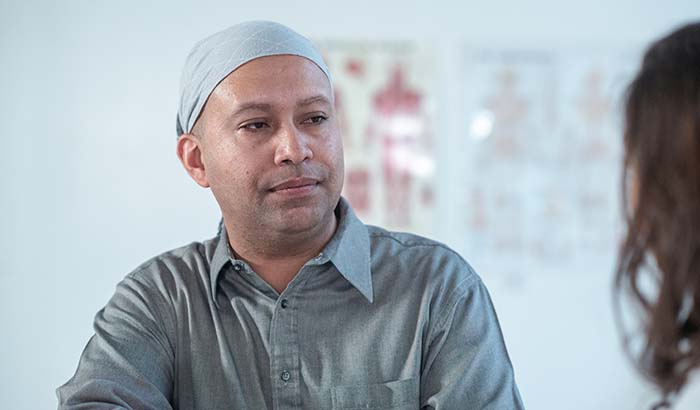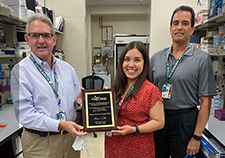Office of Research & Development |
 |
Office of Research & Development |
 |


In a VHA National Precision Oncology Program gene-sequencing study based on more than 3,700 tumor specimens, the majority of samples came from men with lung, prostate or colorectal cancers. (Photo for illustrative purposes only. ©iStock/FatCamera)
October 3, 2019
By Tristan Horrom
VA Research Communications
"Precision oncology is the future of cancer care."
An initial study by Durham VA Health Care System researchers has shown that VA’s National Precision Oncology Program (NPOP) has been effective in delivering personalized cancer care across the VA health care system. By sequencing genetic samples from cancer patients, the researchers were able to find mutations that could be treated with approved therapies or clinical trials for the majority of patients. The study shows that this approach is feasible for patients across VA, including those in rural areas who may have more limited access to health care.
Dr. Pradeep Poonnen—one of the lead authors on the paper and a researcher at the Durham VA Health Care System and Duke University Medical Center—explained the importance of expanding precision oncology: “Precision oncology is the future of cancer care. NPOP’s current molecular profiling of tumors is limited to DNA sequencing, but RNA, proteomic, metabolomic, and epigenetic assessments are likely to be added to our understanding of profiling, and are likely to provide better understanding and more targeted approaches to cancer care.”
 Donwload
Donwload
The results appeared May 26, 2019, in the Journal of Clinical Oncology.
VA established NPOP in 2016 to implement and standardize precision oncology in the Veterans Health Administration. VHA is the largest single provider of cancer care in the United States.
In precision oncology, physicians take samples of tumors or blood and sequence a patient’s tumor DNA. They can then identify genes known to play a role in cancer and find specific mutations that are causing the cancer to grow. This allows the patient to benefit from drugs and other therapies that are targeted specifically to those mutations.
For this trial, researchers took samples of tumor tissue or blood from more than 3,000 Veterans with advanced solid tumors. Most of the samples were from men with lung, prostate, or colorectal cancers. Samples came from 72 VA facilities across the country. The samples then went through next-generation sequencing using IBM Watson for Genomics, through a partnership between VA and IBM.
The results showed that, overall, 70% of patients had at least one actionable mutation, meaning that a drug or treatment could directly target that mutation to fight the cancer. About 9% of patients had mutations for which there is already an FDA-approved targeted drug or immunotherapy.
Another 52% of patients had an actionable mutation that does not currently have a corresponding FDA-approved treatment, but were eligible and recommended to receive targeted therapy through a clinical trial. While many cancer-causing mutations may not yet have widely available drugs approved by the FDA, patients could still benefit from participating in clinical trials that are testing new treatments. “These results underscore the importance of increasing clinical trial availability to Veterans,” note the researchers.

VA researchers using AI to decide best treatment for rectal cancer

VA center training the next generation of researchers in blood clots and inflammation

AI to Maximize Treatment for Veterans with Head and Neck Cancer

VA investigator brings diversity into autoimmune disease research
For the remaining 9% of patients with an actionable mutation, a drug approved for a different type of cancer may be effective for their cancer. For these patients, significant data show that an FDA-approved drug for treating a different cancer may also benefit patients with another type of cancer. For example, there is evidence that a drug approved for breast cancer may also be affective against similar mutations in stomach cancer.
Out of 3,182 patients whose genes were sequenced, 136 received FDA-approved precision oncology treatments. The most frequently prescribed treatment was targeted immune checkpoint inhibitors. These drugs help to prime the body’s immune system so that it can attack cancer cells. Reasons patients may not have received treatment include patients dying before they could be treated, and providers not knowing how to interpret the test results or not having access to the medications. The research team is currently studying ways to address these barriers to care.
The results showed the most commonly mutated genes linked to cancer in these Veterans, which could help direct further research into this targeted approach to cancer treatment. The most common mutations in the study were to the gene TP53, seen in 66% of the samples. This result is consistent with other studies, which showed that mutation to TP53 is commonly linked with cancer. The gene ATM was mutated in 28% of patients, while the gene KRAS was mutated in 27%.
Taken together, the results show that “clinical implementation of precision oncology is feasible across the VHA health care system,” write the researchers. By sequencing patients’ genes, doctors may be able to prescribe treatment tailored to each patient’s specific cancer.
Beyond showing that NPOP can link cancer patients in VA to the most effective treatments, the study also found that the program can reach rural Veterans as well as those who live in urban areas. The percentage of VA cancer patients who live in rural areas is about twice the national average. A larger percentage of Veterans in general live in rural or highly rural communities, compared to the civilian population.
According to the Centers for Disease Control and Prevention, rural areas of the United States have higher mortality rates from cancer than urban areas. Cancer death rates have been decreasing nationwide in recent years, but this number is falling at a slower rate in rural areas. This disparity can most likely be traced to limited access to health care and cutting-edge technologies in rural areas, say the researchers.
Poonnen emphasizes the importance of creating a precision oncology program that can reach Veterans across the country, including in rural areas. “Most previous studies of large-scale precision oncology are performed at single academic centers or single health systems,” he explains. “However, the VA is a nationwide system with urban, suburban, and rural centers delivering cancer care, and is likely to be more representative of the U.S. population at large, not all of whom have their care delivered at an academic center.”
NPOP has made a concerted effort to enroll rural Veterans. Out of all the Veterans participating in the study, 34% lived in rural areas. Rural Veterans represented 39% of patients who received targeted therapies to treat their cancer. According to the researchers, “The NPOP experience, therefore, may inform strategies to maximize participation of patients with cancer who live in rural areas in precision medicine programs in other health care systems.”
NPOP is an ongoing program that will continue to grow. As the number of patients undergoing testing continues to grow, researchers will be able to study more patient outcomes in specific cancers. According to Poonnen, “We are also actively researching ways to improve access to this testing in rural areas, and identifying barriers to implementation (lack of pathology infrastructure, education, etc.).”
NPOP is part of a larger effort by VA to invest in precision oncology. In 2016 VA launched two other programs, Research for the Precision Oncology Program (RePOP) and the Precision Oncology Data Repository (PODR), to acquire the knowledge and establish the capabilities necessary to improve the care of Veterans with cancer. RePOP provides a mechanism to recruit patients for broader sharing of data and reuse of tumor tissue, while PODR serves as a repository for their data and supports research activities such as creating predictive models, developing advanced analytic techniques, and building clinical applications.
These efforts are intended to share data with the larger research community. PODR is partnering with the University of Chicago to host a hybrid cloud infrastructure to provide greater access to VA data and robust computing resources for the research community. These efforts complement and integrate with VA partnerships with the Department of Defense and the National Cancer Institute.
The study was funded by the VA National Precision Oncology Program. Two commercial laboratories—Personalis and Personal Genome Diagnostics—performed the gene sequencing.
VA Research Currents archives || Sign up for VA Research updates